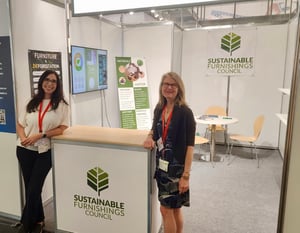Cascale Acquisition
SFC's Next Chapter Continues with Cascale
Nearly two decades ago, leading furniture manufacturers founded the Sustainable Furnishings Council...

In October 2006, a group of eco-conscious individuals and companies gathered at the High Point Market to form what would become the Sustainable Furnishings Council (SFC). Their mission was clear: to commit to sustainability in an industry that was about to undergo significant transformation. Little did they know that over the next 17 years, the world of furnishings would change in unimaginable ways.
Over the past decade, the world witnessed the rise of fast fashion and fast furniture, taking over the marketplace like a wildfire. Americans discarded over 12 million tons of furniture and furnishings in 2018, a staggering increase from 2.2 million tons in 1960. Shockingly, more than 80% of this discarded furniture ended up in landfills, as reported by the Environmental Protection Agency (EPA). In a world dominated by cheaply-built, easily-replaced, and often-toxic furniture, how could SFC members, committed to FSC-certified wood, rapid-renewable materials, fair wages, and sustainable practices, compete?
The answer lay in transparency and storytelling. Consumers today hold companies accountable for the products they make and sell. SFC members recognized that sharing their sustainability stories with customers was a powerful way to distinguish themselves in a crowded market. Through transparency, they showcased their commitment to eco-friendly practices and ethical production.
Back in 2006, the concept of "sustainability" was still in its infancy, often seen as a lofty ideal rather than a viable business plan. Many wondered how a furnishings company could remain financially viable while adhering to strict sustainability principles. It seemed like an unattainable goal.
However, SFC's Founding Members proved that sustainability and profitability could coexist. By joining SFC, they gained access to knowledge, innovation, and a supportive community that encouraged them to be transparent about their sustainable practices and goals. Even as fast furniture gained ground, these members remained unwavering in their commitment to sustainability.
Today, if you explore the SFC MEMBERS' PAGE, you'll find a plethora of sustainable leaders. These companies have shown that sustainable practices not only benefit the planet but also resonate with customers. Their commitment to sustainability has earned them customer loyalty, proving that ethical business practices are not only possible but also profitable.
The Sustainable Furnishings Council has come a long way since its inception in 2006. It has weathered the storms of change in the furnishings industry and emerged stronger than ever. Legacy companies that laid the foundation for the SFC now welcome new members who share the same sustainable principles.
SFC's mission remains vital in an era where sustainability is not just an option but a necessity. As companies continue to navigate market changes, they find strength in transparency, innovation, and community support. Through SFC, they exchange ideas and inspire one another to create a more sustainable future, one step at a time.

Executive Director

Nearly two decades ago, leading furniture manufacturers founded the Sustainable Furnishings Council...

The Sustainable Furnishings Council was proud to participate in interzum 2025 in Cologne,...